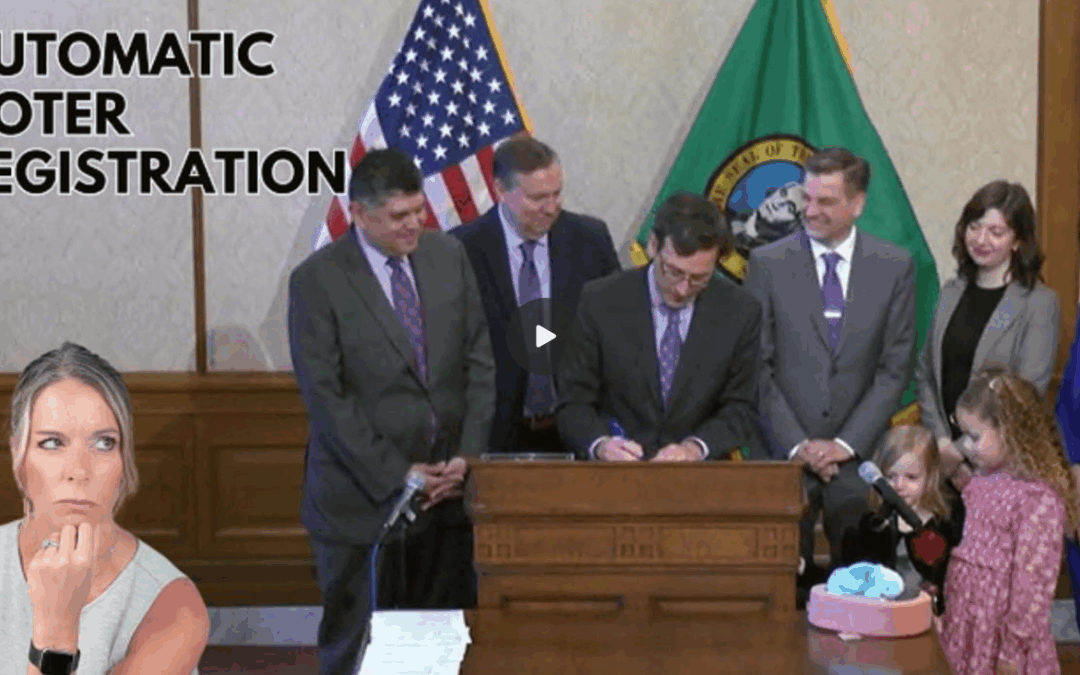Olympia, WA – On May 17, 2025, Governor Bob Ferguson signed Senate Bill 5077into law, marking a significant expansion of Washington State’s automatic voter registration program. We’ve been closely tracking this bill throughout the 2025 legislative session, and it’s time to unpack what this means for Washington voters—and why it should concern Americans nationwide.
What is Senate Bill 5077?
Washington’s Motor Voter Law, enacted in 2018, automatically registers voters when they obtain a driver’s license unless they opt out. Senate Bill 5077 takes this a step further, extending automatic voter registration to other state agencies and even tribes. If you sign up for health insurance through the state’s Health Benefits Exchange, apply for food stamps, or access other government services, you’ll be registered to vote unless you explicitly opt out. The catch? The opt-out process remains unclear, and it’s likely to be discreet, making it easy to miss.
The Argument for the Bill
Supporters, led by prime sponsor Senator Javier Valdez, argue that this bill enhances access to voting and fosters a “more inclusive democracy.” They claim it ensures every eligible Washingtonian can participate in the electoral process. But here’s where the narrative gets murky.
The Concerns
While the bill is framed as a win for democracy, it raises serious questions about election integrity:
- Voter Roll Security: Expanding automatic registration across multiple agencies increases the risk of errors or fraudulent registrations.
- Data Security: With more agencies handling sensitive voter information, the potential for data breaches grows.
- Non-Citizen Voting: Without robust safeguards, non-citizens could inadvertently—or intentionally—be added to voter rolls, especially if the opt-out process is unclear.
Washington’s election system has faced scrutiny since the controversial 2004 gubernatorial race between Dino Rossi and Christine Gregoire, where recounts and “found” ballots raised red flags. Over the past two decades, Democrats have incrementally reshaped the state’s election laws, from universal mail-in voting to this latest expansion of automatic registration. Unraveling these changes will be a long and arduous process.
Why This Matters Beyond Washington
If you’re not a Washington resident, don’t tune out—this is a warning. Democrats are pushing similar policies in other states and at the federal level. The failure of the Senate to pass the SAVE Act (although it could still happen), which would require proof of citizenship for federal elections, underscores the urgency of staying vigilant. Washington’s experience shows how quickly election laws can shift, often under the guise of “strengthening democracy.”
The Bigger Picture: Republic, Not Democracy
A critical point often overlooked is the language used in this debate. America is a constitutional republic, not a pure democracy. Our system is designed to protect individual rights and prevent mob rule. Yet, both Democrats and some Republicans have adopted the “democracy” rhetoric. In January 2025, Washington Republicans held a “Rally for Democracy” after Democrats silenced them on the House floor. We must reject this framing and reaffirm our commitment to the constitutional republic our Founders established.
What Can You Do?
Reversing these trends starts at the local level:
- Get Involved Locally: Support non-Democrat candidates for city and county councils. Building a strong local foundation is the first step to influencing state-level change.
- Stay Informed: Monitor proposed legislation in your state and engage with your legislators. Testify for or against bills to make your voice heard.
- Spread Awareness: Share this post to educate others about the implications of laws like Senate Bill 5077.
Washington’s election laws won’t change overnight but staying engaged and informed is the only way to push back against policies that threaten election integrity. For those in Washington, repealing problematic laws like this one requires electing more Republicans to office—a process that begins with grassroots efforts. For those elsewhere, heed this as a cautionary tale and act before similar laws take root in your state.

